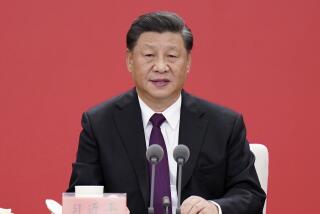Chinese Film’s Version of Mao Backfires
- Share via
BEIJING — The real Mao Tse-tung hounded critics to death. But in the latest version of history according to China’s state film industry, Mao treasures free speech and criticism of his regime.
“Mao Tse-tung and Edgar Snow” tells the story of Mao and the American journalist who met him in 1936, when China’s future Communist rulers were an obscure band of rural guerrillas.
“Mao is anxious to create a fair society,” Snow says in one scene.
“It’s right that he points out our problems,” the silver-screen Mao says when Snow later writes critically about his economic policies.
China has one of the world’s few remaining Communist film industries, and its state studios still turn out a stream of pictures meant to give the ruling party’s view of history.
The propaganda films aren’t popular with Chinese audiences, who have more choices than they used to. China’s film industry also produces popular dramas and slapstick comedies. Some Hollywood films, including “Titanic” and “Pearl Harbor,” have played to large audiences in theaters. And a huge selection of domestic and foreign fare is available on $1 pirated home videos.
“Mao and Snow” bombed at the box office and might have disappeared into obscurity like most of China’s cinematic propaganda. Instead, it has backfired on its makers and provoked controversy by enraging Snow’s widow.
Lois Wheeler Snow, who lives in Switzerland, where her husband died in 1972, accuses the filmmakers of abusing his memory to support a government that she says has betrayed his principles.
Edgar Snow interviewed Mao early, traveling to the remote Communist guerrilla base in western China. He stayed in China until the early 1940s reporting on its civil war, which ended in 1949 with Communist victory. His sympathetic book “Red Star Over China” influenced American views of Chinese leftists.
Snow is officially regarded as a “friend of China” and half of his ashes are interred on the campus of Peking University.
The movie shows Mao and his communists as earnest super-patriots. Snow, played by American businessman John A. Gardner, a first-time film actor, declares: “I love China. I will stand by her and fight the fascists, Nazis and imperialists.”
Snow’s widow is unhappy that filmmakers have included him in efforts to promote the party, and she complains about their use of material from “Red Star Over China.”
In a phone interview from Switzerland, Wheeler Snow said her husband and Mao had a “very special relationship” based not on personal friendship, but on mutual concern for the Chinese people.
She become a critic of the government after the army crushed pro-democracy protests in Tiananmen Square in 1989. Last year, she threatened to remove Snow’s ashes from the university after police blocked her from visiting the mother of a protester killed in 1989.
“The present Chinese leaders not only, in my belief, betrayed the principles of the revolution, but they dare to assume they are friends with Edgar Snow,” Wheeler Snow said.
Director Song Jiangbo said he canceled a screening for foreign reporters after the controversy with Wheeler Snow surfaced.
China’s propaganda pictures increasingly use high-quality photography and sound. “Mao and Snow” includes actors from the United States, Canada and the Middle East, and scenes shot in Switzerland.
“Mao and Snow” is one of a batch of films released to coincide with the 80th anniversary last year of the Communist Party’s founding. One recent week, it shared Beijing cinemas with “Mao Tse-tung in 1925,” about the party’s perilous early years.
Despite public ambivalence about such films, with their heavy-handed scripts and one-dimensional characters, propaganda bosses are calling for more. Television shows and films based on the official version of Communist history are “effective textbooks for education in patriotism and revolutionary tradition among Chinese people,” the party’s propaganda chief, Ding Guangen, told a recent meeting of the State Administration of Radio, Film and Television.
On a recent Tuesday afternoon, barely a dozen people were seated in the dark of Beijing’s Capital Theater to see “Mao and Snow.” Most were employees of a state bank who got time off and free tickets.
“You can’t really compare it to a normal movie,” said one man, who declined to give his name. “It was better than ‘Mao Tse-tung in 1925.’”
Gardner was quoted by the official newspaper China Daily as saying he wants to take the picture to the United States.
“Young Americans should watch the film and learn more about Snow and his friendship with Mao and China,” Gardner was quoted as saying.
More to Read
Only good movies
Get the Indie Focus newsletter, Mark Olsen's weekly guide to the world of cinema.
You may occasionally receive promotional content from the Los Angeles Times.









